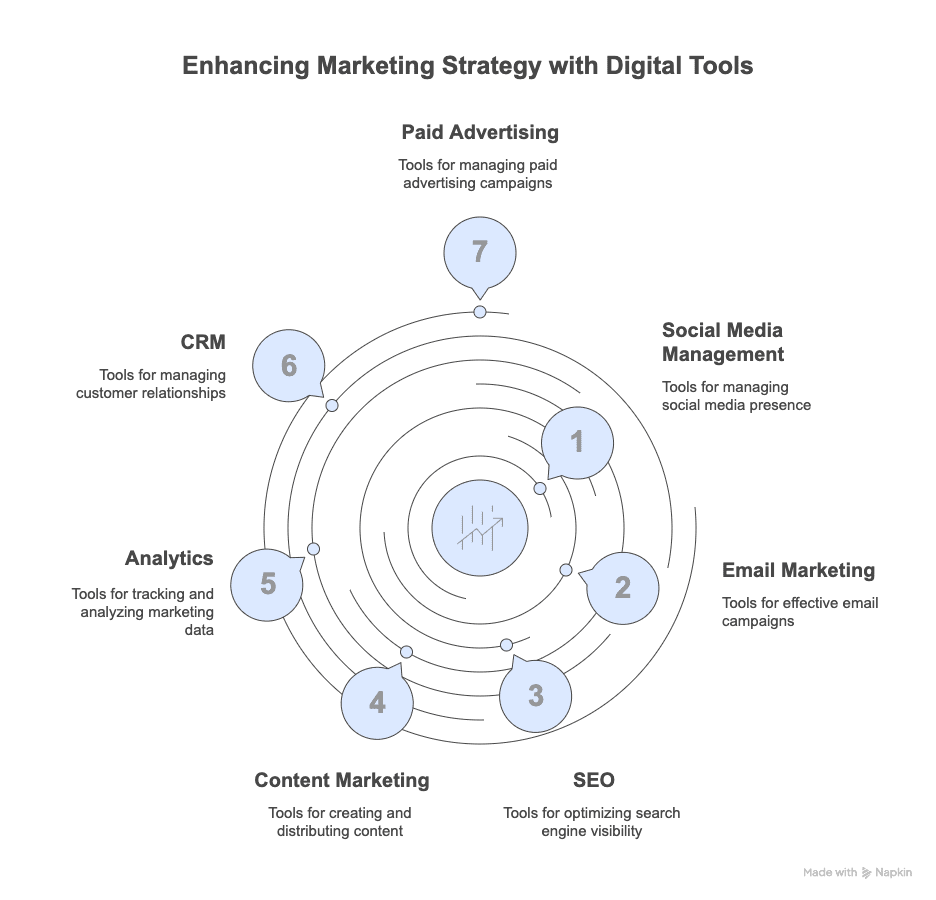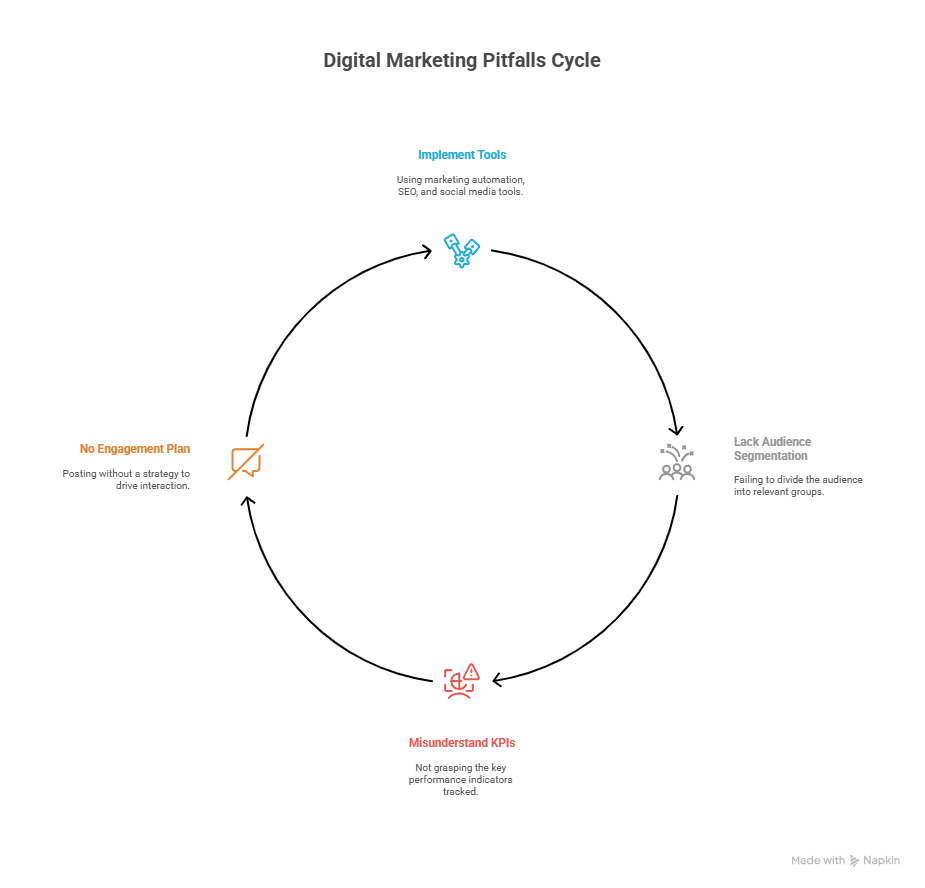Table of Contents
- Introduction
- Tool #1: Google Analytics
- Tool #2: SEMrush
- Tool #3: Google Ads
- Tool #4: HubSpot
- Tool #5: Canva
- Tool #6: Mailchimp
- Tool #7: Hootsuite
- Tool #8: Ahrefs
- Tool #9: Meta Ads Manager
- Tool #10: WordPress
- Key Takeaways
- FAQs
- Conclusion
Introduction

So you want to get started in digital marketing! It’s an exciting field—fast-paced, data-driven, and creative all at once. But here’s the catch: you need the right Digital Marketing Tools to thrive. Just like a carpenter relies on a solid set of tools, a digital marketer must master platforms that power everything from SEO and paid ads to content, automation, and analytics.
In this blog, we’ll take you through the top 10 Digital Marketing Tools that you’ll get hands-on experience with in a comprehensive course. These aren’t just buzzwords—they’re the same tools used by top agencies and marketing teams around the globe. Whether you’re a beginner or looking to upskill for that next big job, this list is your go-to guide.
1. Google Analytics
Marketing tools for beginners
Google Analytics is the backbone of any marketer’s measurement strategy. It helps you understand your audience, track website traffic, analyze behavior, and fine-tune your digital campaigns. Learning to navigate its dashboard, interpret data trends, and set custom goals is fundamental.
Google Analytics is one of the most effective digital marketing tools available, helping marketers to make the best – data-driven decisions possible. In this course you will learn how to analyze bounce rates, conversion rates, acquisition channels, and more – real time analysis that makes a real difference!
Key Metrics You’ll Learn to Track:
| Metric | Description |
| Bounce Rate | % of users who leave without interaction |
| Conversion Rate | % of users who complete a goal |
| Traffic Sources | Channels like Organic, Paid, Social |
| Session Duration | Avg. time spent on site |
2. SEMrush
Top tools for digital marketers
Want to spy on your competitors (legally, of course) and boost your SEO game? That’s where SEMrush comes in. This robust platform offers keyword tracking, backlink analysis, SEO auditing, and more.
It’s one of the most essential tools for marketers working in SEO. You’ll learn how to find low-competition keywords, audit site health, and conduct deep competitor research. If you want to dominate Google search results, SEMrush is your weapon.
Features Covered in the Course:
- Keyword Magic Tool
- Domain vs. Domain analysis
- Position tracking
- Site audit
- Backlink checker
3. Google Ads
Tools used in digital marketing
This is a comprehensive course in the realm of Pay-Per-Click advertising via Google Ads. Learn how to create search and display campaigns, write engaging ad copy, and optimize landing pages for the highest ROI.
Among the most powerful digital marketing software tools, Google Ads teaches you the nuances of bidding strategies, quality scores, and conversion tracking. Plus, you’ll explore A/B testing and remarketing techniques.
Google Ads in Practice:
| Campaign Type | Use Case |
| Search Ads | Drive high-intent traffic |
| Display Ads | Brand awareness & retargeting |
| Video Ads | YouTube campaigns |
| App Campaigns | App installs & engagement |
4. HubSpot
Marketing tools taught in courses
HubSpot’s all-in-one marketing platform makes it easier to execute inbound campaigns. It’s widely used for customer relationship management (CRM), email marketing, social media scheduling, and landing page creation.
You’ll learn how to use HubSpot to set up automated workflows, lead scoring, and CRM-based nurturing. It’s also a favorite among recruiters, making it a top tool for digital marketers looking to break into marketing automation.
Key Skills You’ll Learn:
- Email sequence creation
- CRM segmentation
- Workflow automation
- Lead tracking and nurturing
5. Canva
Best digital marketing tools
Designing engaging creatives is no longer just a designer’s job. With Canva, you’ll create banners, infographics, ads, and social media posts—even if you have zero design experience.
It’s beginner-friendly and highly versatile. As one of the marketing tools for beginners, Canva helps you develop visual storytelling skills that drive engagement. This course includes training on using brand kits, templates, and animation tools.
What You’ll Be Creating:
- Social media posts
- Blog banners
- Infographics
- YouTube thumbnails
- Paid ad creatives
6. Mailchimp
Essential tools for marketers
Email marketing may be old school, but it’s still incredibly effective—and Mailchimp is the go-to tool for creating automated email journeys. In this course, you’ll learn to build email lists, segment audiences, and craft engaging email content.
Mailchimp makes it easy to analyze campaign performance. The platform integrates with CRMs, landing pages, and even e-commerce tools, making it part of every serious digital marketing software list.
Email Strategies You’ll Learn:
- Welcome email series
- Abandoned cart automation
- Newsletter creation
- List segmentation
- Performance reporting
7. Hootsuite
Marketing tools for beginners
Managing multiple social media platforms can feel chaotic. Hootsuite simplifies that by letting you schedule posts, track mentions, and measure engagement—all from one dashboard.
In the course, you’ll learn how to schedule content calendars, analyze engagement metrics, and monitor brand mentions in real time. Hootsuite is an indispensable tool for social media managers and community engagement specialists.
Social Channels Supported:
| Platform | Functionality |
| Posts, Stories, Ads | |
| Twitter/X | Tweets, Scheduling |
| Professional content | |
| Visual storytelling |
8. Ahrefs
Top tools for digital marketers
Ahrefs is another SEO powerhouse. While SEMrush focuses more on holistic digital marketing, Ahrefs specializes in backlink analysis and keyword opportunities.
In this course, you’ll learn to use Ahrefs for keyword research, competitor tracking, content gap analysis, and link building. It’s one of the top digital marketing tools for professionals aiming to improve domain authority and traffic.
Course Coverage Includes:
- Content Explorer
- Keywords Explorer
- Backlink audits
- Link Intersect
- Organic traffic estimator
9. Meta Ads Manager
Tools used in digital marketing
Meta Ads Manager (formerly Facebook Business Manager) enables campaign creation and optimization across Facebook and Instagram. You’ll learn targeting strategies, A/B testing, budgeting, and performance tracking.
You’ll also understand how Meta’s pixel works and how to retarget users based on past behavior. This tool plays a crucial role in marketing tools taught in courses due to its massive reach and targeting precision.
Core Learning Objectives:
- Custom & lookalike audience creation
- Campaign budget optimization
- Split testing
- Ad creative best practices
10. WordPress
Digital marketing software list
WordPress is the most widely used CMS on the planet—and one of the most important aspects of digital marketing. Whether you are blogging, building a landing page, or doing on-site SEO, WordPress is where it all begins.
This course will teach you how to customize themes, add plugins, optimize site speed, and link with SEO tools like Yoast. It is one of the best digital marketing tools to demonstrate your practical skills.
Plugins You’ll Work With:
- Yoast SEO
- Elementor
- WPForms
- Google Site Kit
- WooCommerce (basics)
Key Takeaways
- Learn Digital Marketing Tools like Google Analytics, SEMrush, Canva, and HubSpot hands-on
- Understand the role of each tool in SEO, SEM, email, social, and content
- Gain expertise in tools used in digital marketing to build a well-rounded skill set
- Practice industry-relevant tasks using the best digital marketing tools
FAQs
1. Which is the most important digital marketing tool to learn first?
Google Analytics is often considered foundational – because it helps marketers measure the performance of every other tool or campaign they run.
2. Can beginners handle these tools without a technical background?
Yes! Most tools mentioned are designed for ease of use and this course includes beginner-friendly walkthroughs to ensure accessibility for all.
3. Are they free or paid tools?
Most tools, like Google Analytics, Canva (basic), and Mailchimp (basic), have free versions. Other tools like SEMrush and Ahrefs only have paid plans.
4. How do learning digital marketing tools helps you find jobs?
Recruiters generally look for hands-on experience of tools like – Google Ads, HubSpot & Meta Ads Manager. Having hands-on experience with these tools gives you an advantage.
5. Will I get certifications for using these tools?
Yes, some tools like HubSpot and Google offer certifications which you’ll be guided through as part of the course.
6. How do I know which tool to use for which purpose?
The digital marketing course provides real-life case studies that clearly define tool usage based on marketing goals like lead generation, SEO or content creation.
7. Are these tools useful for freelancers as well?
Absolutely. Freelancers can use tools like Canva, Mailchimp, and WordPress to build and manage campaigns for clients independently.
8. What is the ROI of learning these tools?
Mastering these tools enhances campaign performance, drives traffic and conversions, and makes your profile more employable.
9. Can I learn all these tools in one course?
Yes, the course is structured to teach all 10 tools across modules with practical assignments and expert guidance.
10. Are there updated features in these tools I should know about?
Yes. For example, Google Analytics 4 (GA4) has replaced Universal Analytics and includes predictive insights—covered in the updated course module.
Conclusion
There you have it—the top 10 Digital Marketing Tools you’ll master in this course. From analyzing performance with Google Analytics to automating emails with Mailchimp and optimizing campaigns with SEMrush, these tools are what make you industry-ready. The curriculum is structured for Indian students and professionals looking to break into or advance their digital marketing career.
Want to stay ahead in this ever-changing domain? Start by learning the right tools—and you’re already halfway there.
External Links:

